Earth Testers
Verify that electrical current paths are safely earthed with our large range of earth testers. Earth spike testers, high current loop testers and handy bundle packs with earth stakes, leads and more included all available.
Find out more about Earth Testers below.
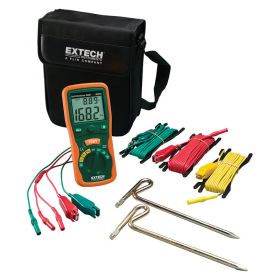
- Comes complete with test leads and two auxiliary Earth bars
- AC/DC voltage, resistance, and continuity testing
- Auto power off
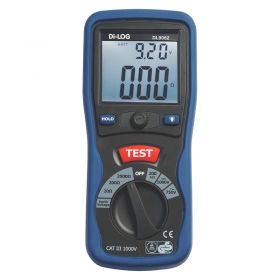
- Measure ground, low-level regular, and liquid resistance
- Perform continuity tests and take voltage measurements
- Earth resistance measurement range of 20Ω to 2000Ω
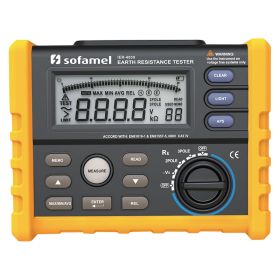
- 2-pole and 3-pole methods
- Results recorded in memory
- Protects user from dangerous voltages
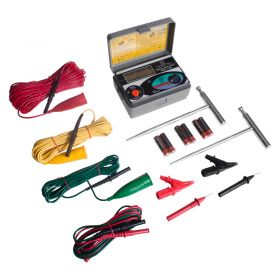
- Three earth resistance measurement ranges - 20, 200 and 2000 Ohms
- Housed in a protective, dust and drip proof case
- 2 wire simplified measurement system
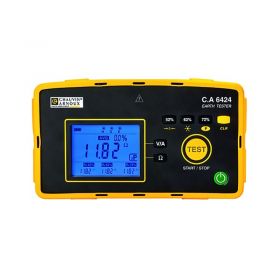
- Earth measurement: 0.05Ω to 50kΩ
- Voltage: up to 600V
- Line/ leakage current: 0.5mA to 60A
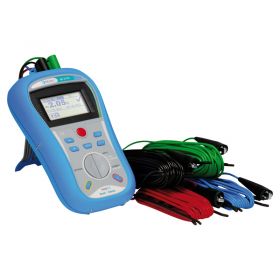
- Simple push button interface designed for use with gloves
- Comes with rechargeable batteries, rods and test leads
- Ergonomic, handheld shape
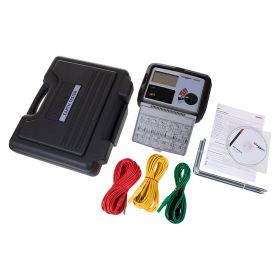
- Ground stake testing
- Attached rod technique ability
- Large LCD display
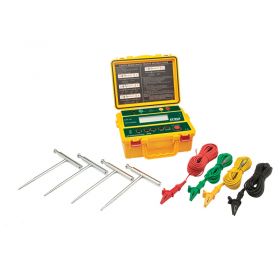
- Earth resistance measurements up to 2000Ω
- 2, 3 and 4 wire testing procedures
- Also measures AC earth voltage
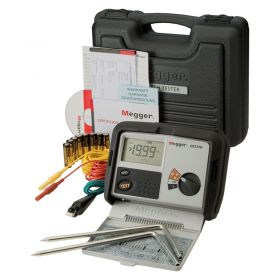
- Measures earth resistance to 2000Ω
- 2 and 3 point testing
- Selectable 25V or 50 V output

- Earth Voltage warning
- Comes in a hard protective case
- CAT Ⅳ100V
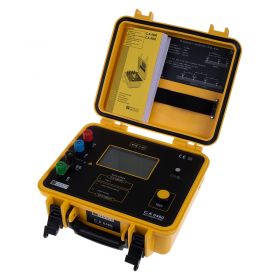
- Measurements of earth, resistivity and coupling
- Watertight protective casing for use wherever you need it
- Superior protection - work safely at all times
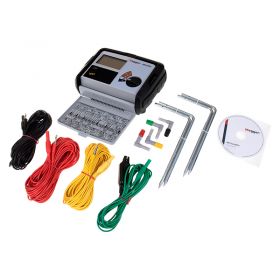
- Two, three and four point testing
- Stakeless testing
- Failure indication
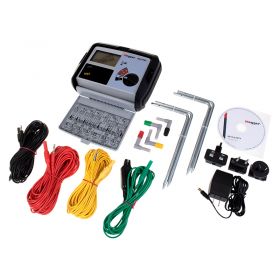
- 2, 3 and 4 point testing
- Rechargeable
- Suitable for use outdoors
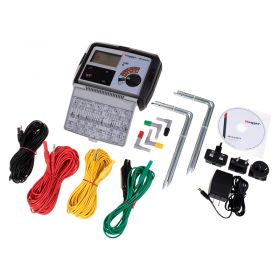
- ART (Attached Rod Technique) capability
- Multiple, user selectable test frequencies
- Includes leads, stakes, calibration certificate and rugged carry case
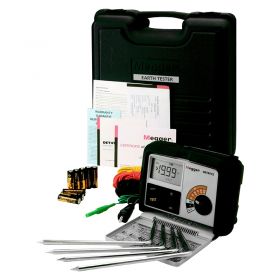
- IP54 safety ratings
- Warning indicators prevent test failure
- Simple one button operation
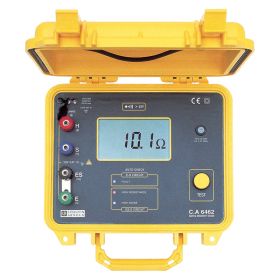
- Rechargeable battery contains almost five hours of power
- Measures up to 1999 Ohms of ground resistance
- User-friendly LCD screen with backlight
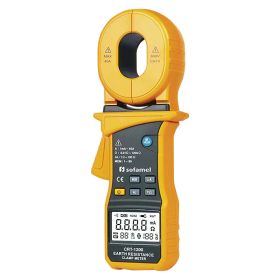
- 3700 V test voltage
- 6.5 mm electric clearance
- Automatic range
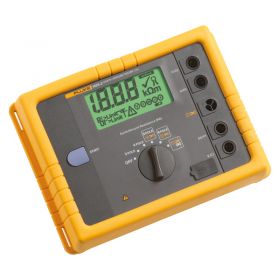
- Four measuring methods
- Suitable for use indoors and outdoors
- High accuracy
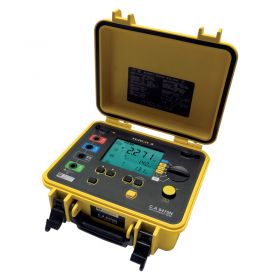
- Rechargeable battery can be charged through the mains or in a car
- Measures earth resistance, frequency, resistivity and coupling
- USB port to send data to your computer
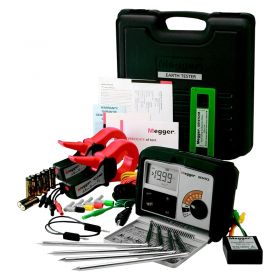
- Includes DET4TCR2 + Clamps
- Perform ART and true stakeless testing
- Wide testing range
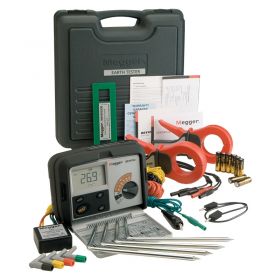
- Free calibration certificate with your device, as well as leads, stakes and a hard wearing carry case
- ICLAMP and VCLAMP provided
- ART and stakeless testing possible
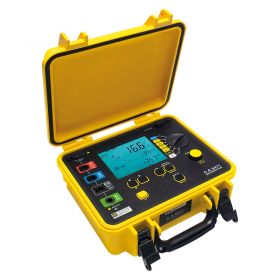
- Range of accessories, including carrying case and mains charger
- Measures earth resistance, coupling, continuity and resistivity
- Backlit LCD screen
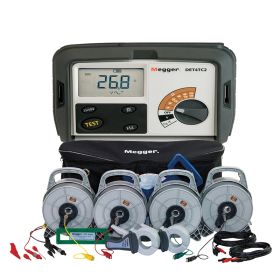
- IP54 safety ratings
- Warning indicators prevent test failure
- Simple one-button operation

- Programmable Auto Sequences
- User-settable high and low limits
- Available in three kits
About Earth Testers
Grounding is an essential part of an electrical installation or system. Proper grounding ensures that the electrical system is safe for use at all times and that electricity flows to earth, rather than through a nearby conductor such as a human.
Grounding systems are different from conventional installations - whereas a standard electrical installation will have a ground wire built in to direct the flow of current, grounding systems only have current flow when there is a problem. Grounding systems create a path for current to flow, but during a problem, current can range from a couple of mA of unwanted static charge to induced voltages or fault currents of several thousand amps. Current flowing to the ground through a grounding system is not constrained to follow any given path to earth as the current would in a normal circuit.
Since this is the case, specialist earth testing equipment is required to ensure that earth grounding systems have overall resistance up to a maximum of 25Ω, which is the standard defined to ensure the overall safety of grounding installation. Although this is the overall standard of resistance, several devices experience problems with ground resistance of this level, and specialist earth equipment can be used with sensitive electronic equipment to carry out proper earth grounding as necessary.
Earth testing equipment allows different kinds of earth grounding to be installed correctly. No matter whether you're carrying out earth grounding in buildings, on equipment, or electronics, there's a piece of equipment in store that can do that.
Proper grounding requires extensive testing procedures before, during, and after the installation of the grounding. Earth testers and other earth testing equipment are used regularly in this field to carry out testing procedures on grounding, allowing users to test such things as voltage measurements (system voltage and static electricity voltages), current measurements (system currents and leakage currents) and resistance measurements (ground system resistance, soil resistance, and soil PH measurements).
Earth Tester Types
There are many different types of earth testers, suitable for a wide array of different earthing applications. There are clamp-on ammeters, clamp-on leakage current meters, electrostatic locator meters, multimeters, three-terminal ground resistance meters, four-terminal ground resistance meters, and soil pH meters. There's also a selection of accessories available for these different products that expand the overall capabilities of the tester. Example accessories used with earth testers included earth spikes, cable reels, and attachable optional clamps.
The following equipment types are suitable for the following grounding applications:
| Test or Measurement | Test Instrument |
| Measuring circuit, system, or ground voltages | Standard voltmeter |
| Measuring circuit or system current | Standard clamp-on ammeter |
| Measuring ground leakage current | Clamp-on leakage current meter |
| Measuring static electrical charges | Electrostatic discharge meter |
|
Measuring earth ground system (ground rod/grid, ground connections etc.) resistance without connecting the earth's ground to the building grounding system |
Clamp-on ground resistance meter |
|
Measuring earth ground system (ground rod/grid, ground connections etc.) resistance before connecting the earth's ground to the building grounding system |
3-terminal ground resistance meter |
| Measuring the earth's resistance (resistivity) | 4-terminal ground resistance meter |
| Measuring soil pH | pH meter |


